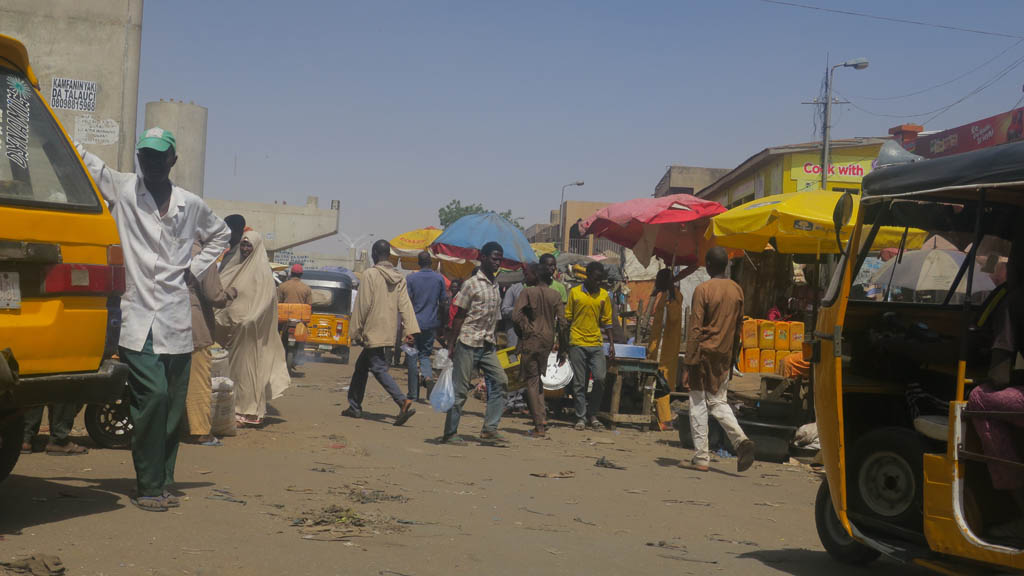Blog February 10, 2017
Dispatch From Nigeria #4: Kano’s Nanaye and Hausa Hip-Hop
Banning Eyre and Sean Barlow are currently in Nigeria, researching the vibrant music scene forAfropop Worldwide‘s Hip Deep series. Here’s their latest field report.
KANO, Nigeria, Feb. 9--Our next stop is Kano, in the mostly Muslim northwest of Nigeria. It’s only a one-hour flight from Lagos, but we spent most of the day at Lagos Airport because harmattan dust storms in Kano made it unsafe to fly. But we got there eventually and were picked up by film actor and all-around charmer Mustapha “Musty,” and film director Salisu Al Mustafa, serving as driver. These two quickly proved to be able, delightful fixers and cultural guides for our six-day stay.
[caption id="attachment_34598" align="aligncenter" width="640"]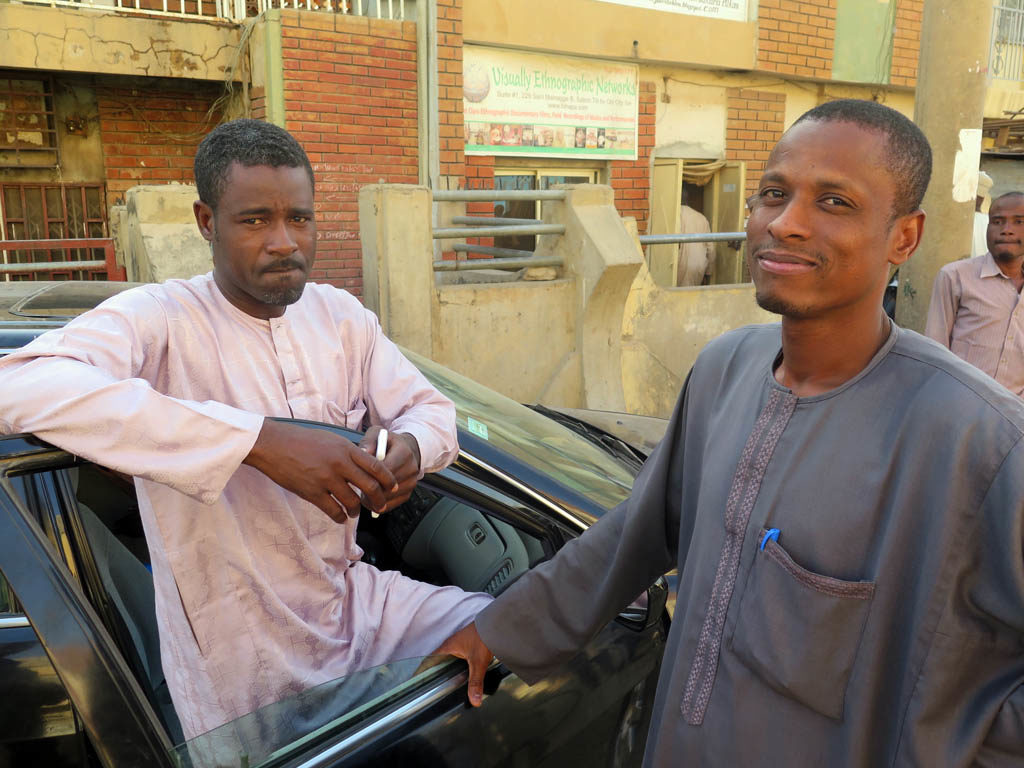 Kano guide Mustapha "Musty," left, with Hassan Sharif.[/caption]
Their car stereo played a song by a smoothly melodious male singer backed by a jaunty multitrack techno mix. This is the music known as nanaye [NAH-nai], songs featured in productions from Kano’s large Hausa film industry: known here as Kannywood. (That term was coined in the late ‘90s, years before the New York Times dubbed the overall Nigerian film industry Nollywood.)
[caption id="attachment_34584" align="aligncenter" width="640"]
Kano guide Mustapha "Musty," left, with Hassan Sharif.[/caption]
Their car stereo played a song by a smoothly melodious male singer backed by a jaunty multitrack techno mix. This is the music known as nanaye [NAH-nai], songs featured in productions from Kano’s large Hausa film industry: known here as Kannywood. (That term was coined in the late ‘90s, years before the New York Times dubbed the overall Nigerian film industry Nollywood.)
[caption id="attachment_34584" align="aligncenter" width="640"]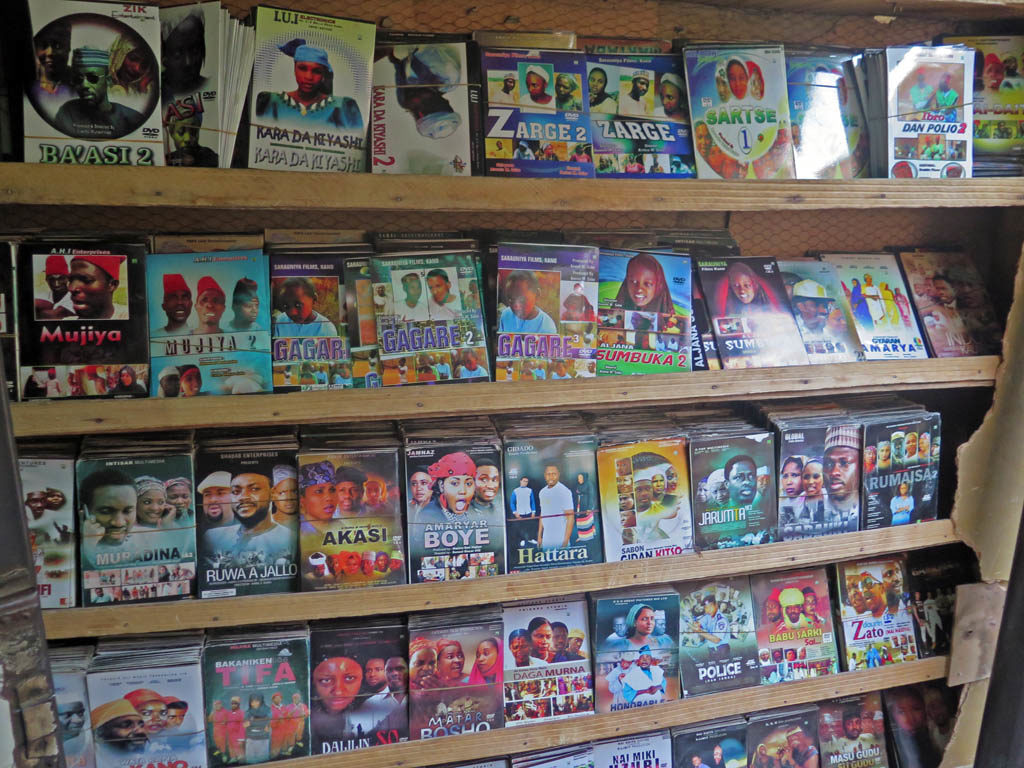 Hausa films, Kano.[/caption]
We began our work the next morning at the office of the Motion Picture Production Association of Nigeria (MOPPAN), where we would conduct numerous interviews with artists, producers, writers and studio executives in the days to come. Within blocks of this office on Zoo Road, there are many small recording studios where music producers and singers are churning out nanaye songs and Hausa hip-hop, the city’s two dominant genres. In the early days of nanaye (1990s), virtually all the songs were for films, but now the film industry is in decline due to piracy, competition from Internet and television options and the recent, severe devaluation of the naira. Artists do release CDs and video albums, and promote themselves on YouTube and Facebook. Some make a living creating praise songs for politicians or wedding ceremonies, not entirely unlike griots in other parts of West Africa.
[caption id="attachment_34577" align="aligncenter" width="640"]
Hausa films, Kano.[/caption]
We began our work the next morning at the office of the Motion Picture Production Association of Nigeria (MOPPAN), where we would conduct numerous interviews with artists, producers, writers and studio executives in the days to come. Within blocks of this office on Zoo Road, there are many small recording studios where music producers and singers are churning out nanaye songs and Hausa hip-hop, the city’s two dominant genres. In the early days of nanaye (1990s), virtually all the songs were for films, but now the film industry is in decline due to piracy, competition from Internet and television options and the recent, severe devaluation of the naira. Artists do release CDs and video albums, and promote themselves on YouTube and Facebook. Some make a living creating praise songs for politicians or wedding ceremonies, not entirely unlike griots in other parts of West Africa.
[caption id="attachment_34577" align="aligncenter" width="640"]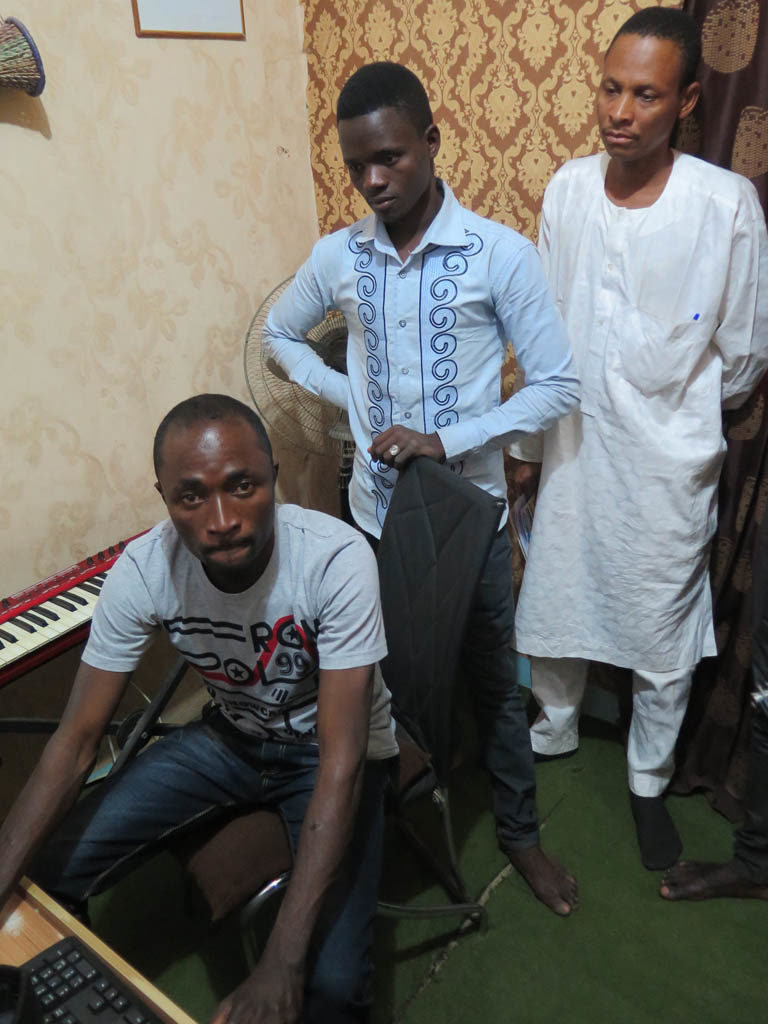 Ahmad Sidiq, left, in the studio.[/caption]
We watched producer Ahmad M. Sadiq rapidly layering beats and melodies to create the bed for a nanaye song, which he then recorded a singer’s vocals on, line by line. The whole process took less than 30 minutes. Nanaye is influenced by Indian film music, but it is sung entirely in Hausa and set to distinctly African beats. The singing is soft and lyrical, obligatorily “sweetened” by Auto-Tune, and generally involving back-and-forth between two singers, male and female. The subject matter overwhelmingly concerns romantic love.
The irony of Kannywood is that it is created in Kano State, the most conservative Muslim province of Nigeria, a place where Sharia law has been applied and embraced for nearly 20 years now. In Kano, you cannot buy alcohol except in the remote Christian quarter (Sabon Gari or “new town”), women dress colorfully but well covered, and public behavior is closely monitored by the religious police known as hisbah. Ever since Kannywood was nearly closed down in 2007, all commercial films and music must be approved by the Censorship Board. We met and interviewed the board’s director, a friendly and thoughtful man, though uncompromising in his insistence that no artistic expression can be tolerated in Kano if it violates the “norms and values” of Islam.
The other musical pole in Kano is a large and growing cadre of young hip-hop artists. You can imagine what they might be up against in this strictly religious milieu. We convened a gathering of about 20 Hausa hip-hop artists—all guys—at Freedom Radio. We were told there are a number of female artists as well, but most are prevented by their families from going out at night, hence their absence here.
[caption id="attachment_34586" align="aligncenter" width="640"]
Ahmad Sidiq, left, in the studio.[/caption]
We watched producer Ahmad M. Sadiq rapidly layering beats and melodies to create the bed for a nanaye song, which he then recorded a singer’s vocals on, line by line. The whole process took less than 30 minutes. Nanaye is influenced by Indian film music, but it is sung entirely in Hausa and set to distinctly African beats. The singing is soft and lyrical, obligatorily “sweetened” by Auto-Tune, and generally involving back-and-forth between two singers, male and female. The subject matter overwhelmingly concerns romantic love.
The irony of Kannywood is that it is created in Kano State, the most conservative Muslim province of Nigeria, a place where Sharia law has been applied and embraced for nearly 20 years now. In Kano, you cannot buy alcohol except in the remote Christian quarter (Sabon Gari or “new town”), women dress colorfully but well covered, and public behavior is closely monitored by the religious police known as hisbah. Ever since Kannywood was nearly closed down in 2007, all commercial films and music must be approved by the Censorship Board. We met and interviewed the board’s director, a friendly and thoughtful man, though uncompromising in his insistence that no artistic expression can be tolerated in Kano if it violates the “norms and values” of Islam.
The other musical pole in Kano is a large and growing cadre of young hip-hop artists. You can imagine what they might be up against in this strictly religious milieu. We convened a gathering of about 20 Hausa hip-hop artists—all guys—at Freedom Radio. We were told there are a number of female artists as well, but most are prevented by their families from going out at night, hence their absence here.
[caption id="attachment_34586" align="aligncenter" width="640"]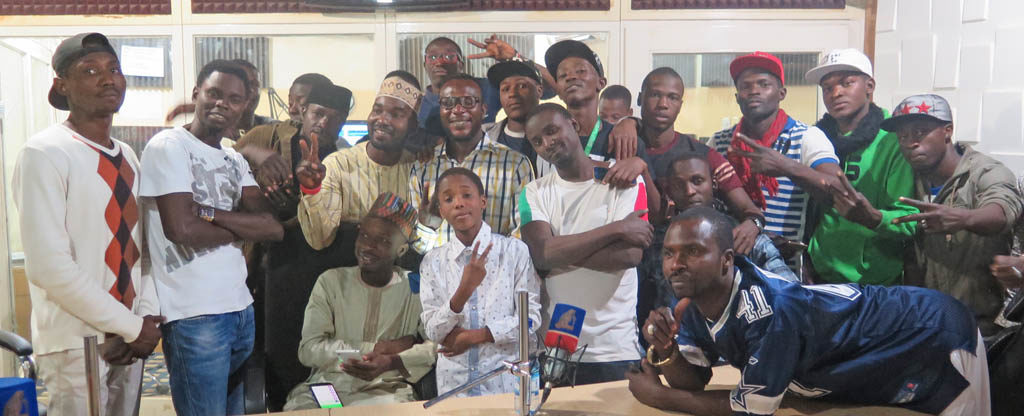 Hausa hip-hop artists' summit, Kano.[/caption]
These brave and talented artists inspired us as they discussed for some three hours their love for the genre, excitement about doing it, their choice to begin rapping in Hausa rather than English or pidgin, the pros and cons of using obscenities and the N-word, and of course, their frustration with the lack of support Hausa hip-hop gets from the local music industry. There are now about six hip-hop radio programs each week, and at least one television program, but live shows are difficult to stage in Kano. You can seek permission of the hisbah (hard to get), move your show to Saban Gari, out-of-the-way, or fly below the radar with the risk that hisbah members will chase down participants and break up your event. All that said, these hip-hop artists are making waves, turning skeptics into fans with their inventive and provocative raps and songs day by day.
[caption id="attachment_34573" align="aligncenter" width="640"]
Hausa hip-hop artists' summit, Kano.[/caption]
These brave and talented artists inspired us as they discussed for some three hours their love for the genre, excitement about doing it, their choice to begin rapping in Hausa rather than English or pidgin, the pros and cons of using obscenities and the N-word, and of course, their frustration with the lack of support Hausa hip-hop gets from the local music industry. There are now about six hip-hop radio programs each week, and at least one television program, but live shows are difficult to stage in Kano. You can seek permission of the hisbah (hard to get), move your show to Saban Gari, out-of-the-way, or fly below the radar with the risk that hisbah members will chase down participants and break up your event. All that said, these hip-hop artists are making waves, turning skeptics into fans with their inventive and provocative raps and songs day by day.
[caption id="attachment_34573" align="aligncenter" width="640"]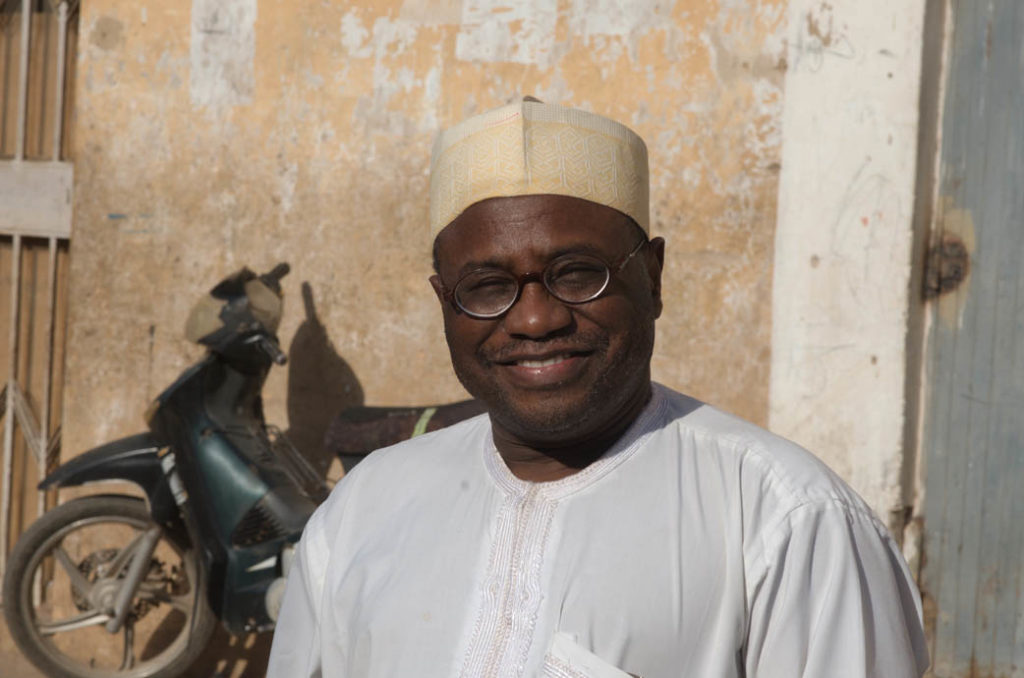 Professor Abdalla Uba Adamu, Kano.[/caption]
Behind all our Kano adventures is one of the hippest Hip Deep scholars ever, Professor Abdalla Uba Adamu. This bright, animated, playful man hooked us up with our excellent fixers and gave us an extraordinary interview about Kano’s music and film. Although a veteran academic and now a government official, Professor Adamu has been like a godfather to Hausa hip-hop artists, championing them from day one, and offering guidance and advice deeply appreciated by artists young enough to be his kids.
[caption id="attachment_34567" align="aligncenter" width="640"]
Professor Abdalla Uba Adamu, Kano.[/caption]
Behind all our Kano adventures is one of the hippest Hip Deep scholars ever, Professor Abdalla Uba Adamu. This bright, animated, playful man hooked us up with our excellent fixers and gave us an extraordinary interview about Kano’s music and film. Although a veteran academic and now a government official, Professor Adamu has been like a godfather to Hausa hip-hop artists, championing them from day one, and offering guidance and advice deeply appreciated by artists young enough to be his kids.
[caption id="attachment_34567" align="aligncenter" width="640"]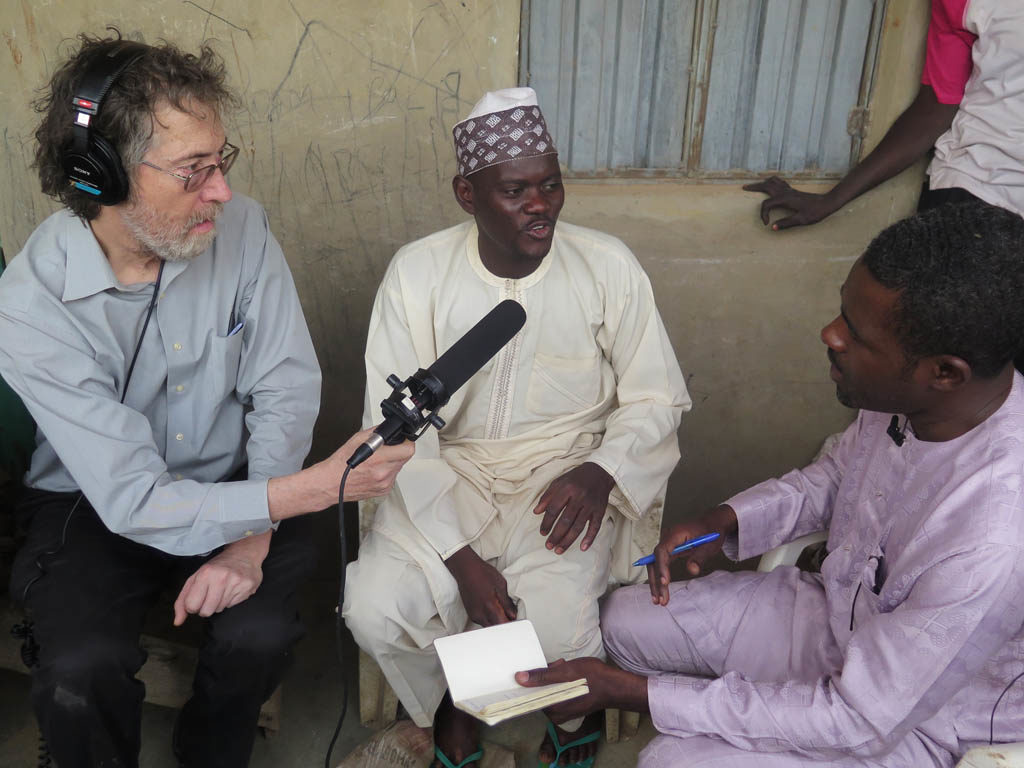 Sean Barlow, left, interviews Nasiru Garba Super, center, in Jogana.[/caption]
We asked Musty and Salisu to introduce us to some traditional musicians. Traditional Hausa music is not heard much in Kano and is reportedly in decline throughout the region as few kids are opting to pick up the torch. We drove out of town to the village of Jogana, passing herds of longhorn cattle and floppy-eared sheep to arrive at the compound of Nasiru Garba Super, master of the one-stringed kokuma fiddle (very similar to the njarka played by Ali Farka Toure and others). Nasiru, his two elderly drummers, and a backup singer delivered a rousing set of songs, several composed by his late, revered father. Soon 50 people from the neighborhood appeared to watch the show and dance in the dusty street. Children stared at us as though they had never seen a white person. And we might well imagine that very few white folks have visited Jogana any time recently. Sean was a big hit with his dancing and dashing of the musicians.
[caption id="attachment_34563" align="aligncenter" width="640"]
Sean Barlow, left, interviews Nasiru Garba Super, center, in Jogana.[/caption]
We asked Musty and Salisu to introduce us to some traditional musicians. Traditional Hausa music is not heard much in Kano and is reportedly in decline throughout the region as few kids are opting to pick up the torch. We drove out of town to the village of Jogana, passing herds of longhorn cattle and floppy-eared sheep to arrive at the compound of Nasiru Garba Super, master of the one-stringed kokuma fiddle (very similar to the njarka played by Ali Farka Toure and others). Nasiru, his two elderly drummers, and a backup singer delivered a rousing set of songs, several composed by his late, revered father. Soon 50 people from the neighborhood appeared to watch the show and dance in the dusty street. Children stared at us as though they had never seen a white person. And we might well imagine that very few white folks have visited Jogana any time recently. Sean was a big hit with his dancing and dashing of the musicians.
[caption id="attachment_34563" align="aligncenter" width="640"]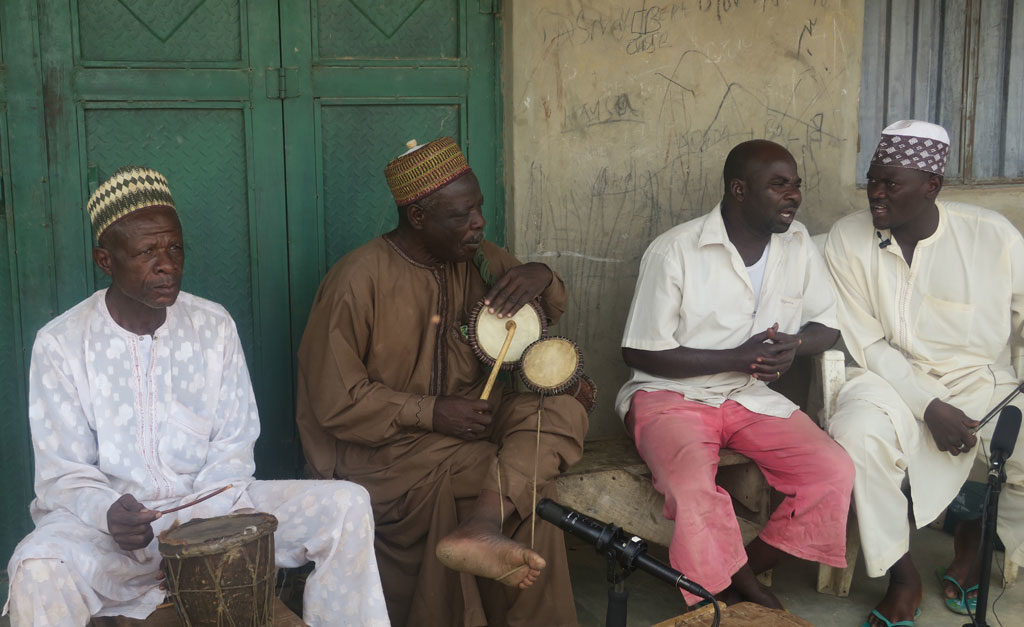 Nasiru, at right, with ensemble in Jogana.[/caption]
[caption id="attachment_34511" align="aligncenter" width="640"]
Nasiru, at right, with ensemble in Jogana.[/caption]
[caption id="attachment_34511" align="aligncenter" width="640"]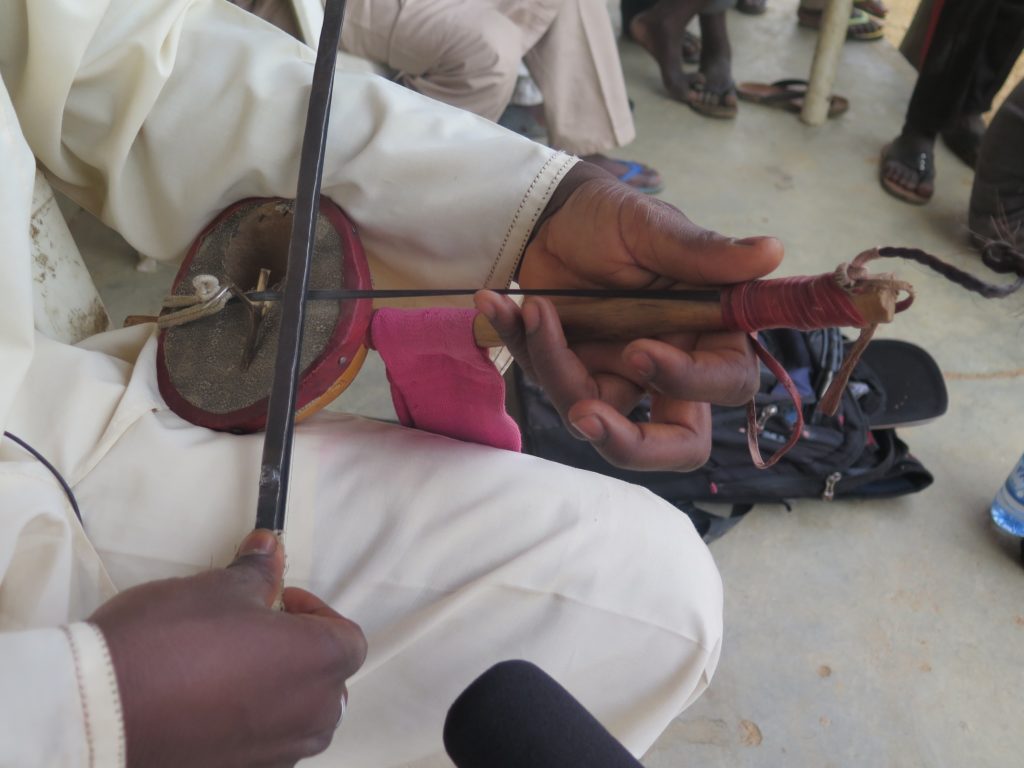 Nasira with kokuma fiddle.[/caption]
In six days in Kano, we conducted about 30 interviews and gathered enough music to have us listening to nanaye and Hausa hip-hop and watching Kannywood films for the next six months. For all our probing, we detected almost no resentment of Sharia restrictions on creativity. It is said that Kano State is a world apart from the rest of Nigeria, and it certainly felt so, a city at peace with its contradictions, in active dialog with its creators and religious authorities, deeply wary of the Christian-Muslim violence to the south in Plateau State and the horrors of Boko Haram to the east. With their good humor, moral clarity and powerful commitment to creative arts, the folks we met in Kano will certainly make for an eye- and ear-opening episode of Hip Deep in Nigeria.
[caption id="attachment_34590" align="aligncenter" width="640"]
Nasira with kokuma fiddle.[/caption]
In six days in Kano, we conducted about 30 interviews and gathered enough music to have us listening to nanaye and Hausa hip-hop and watching Kannywood films for the next six months. For all our probing, we detected almost no resentment of Sharia restrictions on creativity. It is said that Kano State is a world apart from the rest of Nigeria, and it certainly felt so, a city at peace with its contradictions, in active dialog with its creators and religious authorities, deeply wary of the Christian-Muslim violence to the south in Plateau State and the horrors of Boko Haram to the east. With their good humor, moral clarity and powerful commitment to creative arts, the folks we met in Kano will certainly make for an eye- and ear-opening episode of Hip Deep in Nigeria.
[caption id="attachment_34590" align="aligncenter" width="640"]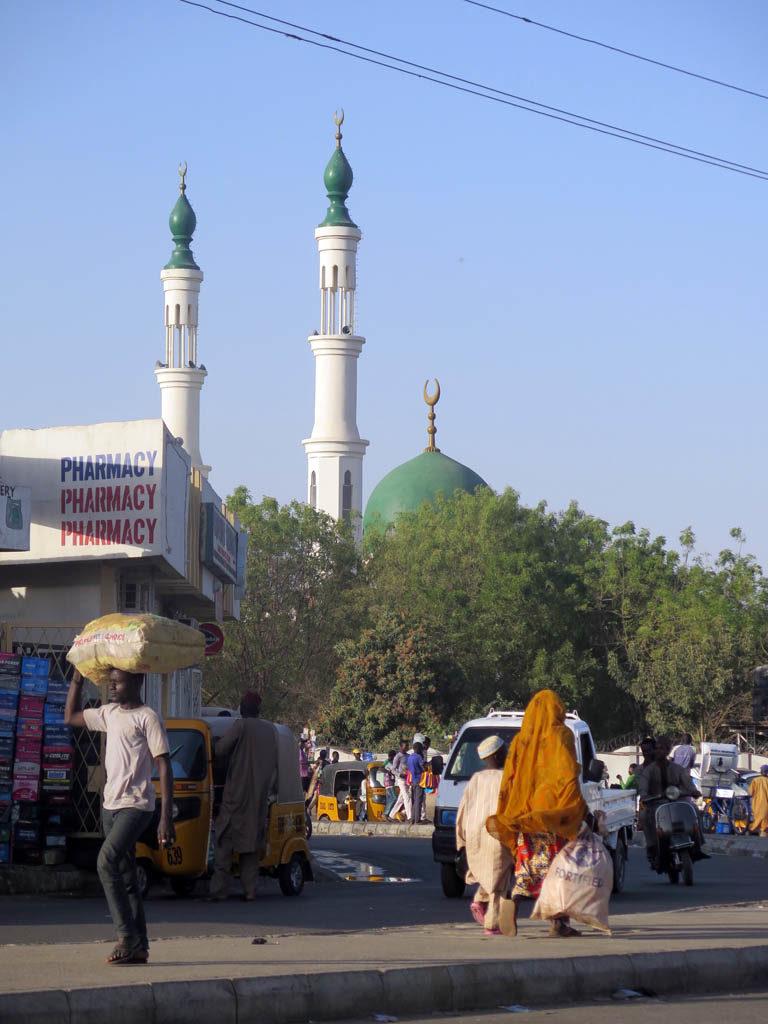 Street scene, Kano.[/caption]
Photos by Banning, Sean and Mustafa “Musty”
Street scene, Kano.[/caption]
Photos by Banning, Sean and Mustafa “Musty”

 With additional support from
With additional support from
 [envira-gallery id="34572"]
[envira-gallery id="34572"]
 Kano guide Mustapha "Musty," left, with Hassan Sharif.[/caption]
Their car stereo played a song by a smoothly melodious male singer backed by a jaunty multitrack techno mix. This is the music known as nanaye [NAH-nai], songs featured in productions from Kano’s large Hausa film industry: known here as Kannywood. (That term was coined in the late ‘90s, years before the New York Times dubbed the overall Nigerian film industry Nollywood.)
[caption id="attachment_34584" align="aligncenter" width="640"]
Kano guide Mustapha "Musty," left, with Hassan Sharif.[/caption]
Their car stereo played a song by a smoothly melodious male singer backed by a jaunty multitrack techno mix. This is the music known as nanaye [NAH-nai], songs featured in productions from Kano’s large Hausa film industry: known here as Kannywood. (That term was coined in the late ‘90s, years before the New York Times dubbed the overall Nigerian film industry Nollywood.)
[caption id="attachment_34584" align="aligncenter" width="640"] Hausa films, Kano.[/caption]
We began our work the next morning at the office of the Motion Picture Production Association of Nigeria (MOPPAN), where we would conduct numerous interviews with artists, producers, writers and studio executives in the days to come. Within blocks of this office on Zoo Road, there are many small recording studios where music producers and singers are churning out nanaye songs and Hausa hip-hop, the city’s two dominant genres. In the early days of nanaye (1990s), virtually all the songs were for films, but now the film industry is in decline due to piracy, competition from Internet and television options and the recent, severe devaluation of the naira. Artists do release CDs and video albums, and promote themselves on YouTube and Facebook. Some make a living creating praise songs for politicians or wedding ceremonies, not entirely unlike griots in other parts of West Africa.
[caption id="attachment_34577" align="aligncenter" width="640"]
Hausa films, Kano.[/caption]
We began our work the next morning at the office of the Motion Picture Production Association of Nigeria (MOPPAN), where we would conduct numerous interviews with artists, producers, writers and studio executives in the days to come. Within blocks of this office on Zoo Road, there are many small recording studios where music producers and singers are churning out nanaye songs and Hausa hip-hop, the city’s two dominant genres. In the early days of nanaye (1990s), virtually all the songs were for films, but now the film industry is in decline due to piracy, competition from Internet and television options and the recent, severe devaluation of the naira. Artists do release CDs and video albums, and promote themselves on YouTube and Facebook. Some make a living creating praise songs for politicians or wedding ceremonies, not entirely unlike griots in other parts of West Africa.
[caption id="attachment_34577" align="aligncenter" width="640"] Ahmad Sidiq, left, in the studio.[/caption]
We watched producer Ahmad M. Sadiq rapidly layering beats and melodies to create the bed for a nanaye song, which he then recorded a singer’s vocals on, line by line. The whole process took less than 30 minutes. Nanaye is influenced by Indian film music, but it is sung entirely in Hausa and set to distinctly African beats. The singing is soft and lyrical, obligatorily “sweetened” by Auto-Tune, and generally involving back-and-forth between two singers, male and female. The subject matter overwhelmingly concerns romantic love.
The irony of Kannywood is that it is created in Kano State, the most conservative Muslim province of Nigeria, a place where Sharia law has been applied and embraced for nearly 20 years now. In Kano, you cannot buy alcohol except in the remote Christian quarter (Sabon Gari or “new town”), women dress colorfully but well covered, and public behavior is closely monitored by the religious police known as hisbah. Ever since Kannywood was nearly closed down in 2007, all commercial films and music must be approved by the Censorship Board. We met and interviewed the board’s director, a friendly and thoughtful man, though uncompromising in his insistence that no artistic expression can be tolerated in Kano if it violates the “norms and values” of Islam.
The other musical pole in Kano is a large and growing cadre of young hip-hop artists. You can imagine what they might be up against in this strictly religious milieu. We convened a gathering of about 20 Hausa hip-hop artists—all guys—at Freedom Radio. We were told there are a number of female artists as well, but most are prevented by their families from going out at night, hence their absence here.
[caption id="attachment_34586" align="aligncenter" width="640"]
Ahmad Sidiq, left, in the studio.[/caption]
We watched producer Ahmad M. Sadiq rapidly layering beats and melodies to create the bed for a nanaye song, which he then recorded a singer’s vocals on, line by line. The whole process took less than 30 minutes. Nanaye is influenced by Indian film music, but it is sung entirely in Hausa and set to distinctly African beats. The singing is soft and lyrical, obligatorily “sweetened” by Auto-Tune, and generally involving back-and-forth between two singers, male and female. The subject matter overwhelmingly concerns romantic love.
The irony of Kannywood is that it is created in Kano State, the most conservative Muslim province of Nigeria, a place where Sharia law has been applied and embraced for nearly 20 years now. In Kano, you cannot buy alcohol except in the remote Christian quarter (Sabon Gari or “new town”), women dress colorfully but well covered, and public behavior is closely monitored by the religious police known as hisbah. Ever since Kannywood was nearly closed down in 2007, all commercial films and music must be approved by the Censorship Board. We met and interviewed the board’s director, a friendly and thoughtful man, though uncompromising in his insistence that no artistic expression can be tolerated in Kano if it violates the “norms and values” of Islam.
The other musical pole in Kano is a large and growing cadre of young hip-hop artists. You can imagine what they might be up against in this strictly religious milieu. We convened a gathering of about 20 Hausa hip-hop artists—all guys—at Freedom Radio. We were told there are a number of female artists as well, but most are prevented by their families from going out at night, hence their absence here.
[caption id="attachment_34586" align="aligncenter" width="640"] Hausa hip-hop artists' summit, Kano.[/caption]
These brave and talented artists inspired us as they discussed for some three hours their love for the genre, excitement about doing it, their choice to begin rapping in Hausa rather than English or pidgin, the pros and cons of using obscenities and the N-word, and of course, their frustration with the lack of support Hausa hip-hop gets from the local music industry. There are now about six hip-hop radio programs each week, and at least one television program, but live shows are difficult to stage in Kano. You can seek permission of the hisbah (hard to get), move your show to Saban Gari, out-of-the-way, or fly below the radar with the risk that hisbah members will chase down participants and break up your event. All that said, these hip-hop artists are making waves, turning skeptics into fans with their inventive and provocative raps and songs day by day.
[caption id="attachment_34573" align="aligncenter" width="640"]
Hausa hip-hop artists' summit, Kano.[/caption]
These brave and talented artists inspired us as they discussed for some three hours their love for the genre, excitement about doing it, their choice to begin rapping in Hausa rather than English or pidgin, the pros and cons of using obscenities and the N-word, and of course, their frustration with the lack of support Hausa hip-hop gets from the local music industry. There are now about six hip-hop radio programs each week, and at least one television program, but live shows are difficult to stage in Kano. You can seek permission of the hisbah (hard to get), move your show to Saban Gari, out-of-the-way, or fly below the radar with the risk that hisbah members will chase down participants and break up your event. All that said, these hip-hop artists are making waves, turning skeptics into fans with their inventive and provocative raps and songs day by day.
[caption id="attachment_34573" align="aligncenter" width="640"] Professor Abdalla Uba Adamu, Kano.[/caption]
Behind all our Kano adventures is one of the hippest Hip Deep scholars ever, Professor Abdalla Uba Adamu. This bright, animated, playful man hooked us up with our excellent fixers and gave us an extraordinary interview about Kano’s music and film. Although a veteran academic and now a government official, Professor Adamu has been like a godfather to Hausa hip-hop artists, championing them from day one, and offering guidance and advice deeply appreciated by artists young enough to be his kids.
[caption id="attachment_34567" align="aligncenter" width="640"]
Professor Abdalla Uba Adamu, Kano.[/caption]
Behind all our Kano adventures is one of the hippest Hip Deep scholars ever, Professor Abdalla Uba Adamu. This bright, animated, playful man hooked us up with our excellent fixers and gave us an extraordinary interview about Kano’s music and film. Although a veteran academic and now a government official, Professor Adamu has been like a godfather to Hausa hip-hop artists, championing them from day one, and offering guidance and advice deeply appreciated by artists young enough to be his kids.
[caption id="attachment_34567" align="aligncenter" width="640"] Sean Barlow, left, interviews Nasiru Garba Super, center, in Jogana.[/caption]
We asked Musty and Salisu to introduce us to some traditional musicians. Traditional Hausa music is not heard much in Kano and is reportedly in decline throughout the region as few kids are opting to pick up the torch. We drove out of town to the village of Jogana, passing herds of longhorn cattle and floppy-eared sheep to arrive at the compound of Nasiru Garba Super, master of the one-stringed kokuma fiddle (very similar to the njarka played by Ali Farka Toure and others). Nasiru, his two elderly drummers, and a backup singer delivered a rousing set of songs, several composed by his late, revered father. Soon 50 people from the neighborhood appeared to watch the show and dance in the dusty street. Children stared at us as though they had never seen a white person. And we might well imagine that very few white folks have visited Jogana any time recently. Sean was a big hit with his dancing and dashing of the musicians.
[caption id="attachment_34563" align="aligncenter" width="640"]
Sean Barlow, left, interviews Nasiru Garba Super, center, in Jogana.[/caption]
We asked Musty and Salisu to introduce us to some traditional musicians. Traditional Hausa music is not heard much in Kano and is reportedly in decline throughout the region as few kids are opting to pick up the torch. We drove out of town to the village of Jogana, passing herds of longhorn cattle and floppy-eared sheep to arrive at the compound of Nasiru Garba Super, master of the one-stringed kokuma fiddle (very similar to the njarka played by Ali Farka Toure and others). Nasiru, his two elderly drummers, and a backup singer delivered a rousing set of songs, several composed by his late, revered father. Soon 50 people from the neighborhood appeared to watch the show and dance in the dusty street. Children stared at us as though they had never seen a white person. And we might well imagine that very few white folks have visited Jogana any time recently. Sean was a big hit with his dancing and dashing of the musicians.
[caption id="attachment_34563" align="aligncenter" width="640"] Nasiru, at right, with ensemble in Jogana.[/caption]
[caption id="attachment_34511" align="aligncenter" width="640"]
Nasiru, at right, with ensemble in Jogana.[/caption]
[caption id="attachment_34511" align="aligncenter" width="640"] Nasira with kokuma fiddle.[/caption]
In six days in Kano, we conducted about 30 interviews and gathered enough music to have us listening to nanaye and Hausa hip-hop and watching Kannywood films for the next six months. For all our probing, we detected almost no resentment of Sharia restrictions on creativity. It is said that Kano State is a world apart from the rest of Nigeria, and it certainly felt so, a city at peace with its contradictions, in active dialog with its creators and religious authorities, deeply wary of the Christian-Muslim violence to the south in Plateau State and the horrors of Boko Haram to the east. With their good humor, moral clarity and powerful commitment to creative arts, the folks we met in Kano will certainly make for an eye- and ear-opening episode of Hip Deep in Nigeria.
[caption id="attachment_34590" align="aligncenter" width="640"]
Nasira with kokuma fiddle.[/caption]
In six days in Kano, we conducted about 30 interviews and gathered enough music to have us listening to nanaye and Hausa hip-hop and watching Kannywood films for the next six months. For all our probing, we detected almost no resentment of Sharia restrictions on creativity. It is said that Kano State is a world apart from the rest of Nigeria, and it certainly felt so, a city at peace with its contradictions, in active dialog with its creators and religious authorities, deeply wary of the Christian-Muslim violence to the south in Plateau State and the horrors of Boko Haram to the east. With their good humor, moral clarity and powerful commitment to creative arts, the folks we met in Kano will certainly make for an eye- and ear-opening episode of Hip Deep in Nigeria.
[caption id="attachment_34590" align="aligncenter" width="640"] Street scene, Kano.[/caption]
Photos by Banning, Sean and Mustafa “Musty”
Street scene, Kano.[/caption]
Photos by Banning, Sean and Mustafa “Musty”

 With additional support from
With additional support from
 [envira-gallery id="34572"]
[envira-gallery id="34572"]







